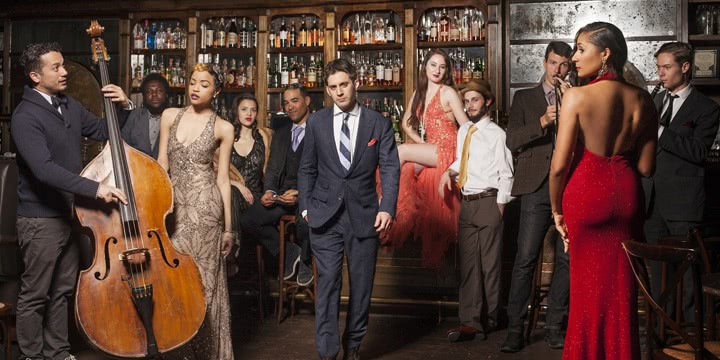Most bands – though not all, it should be noted – possess something unique, whether that be some idiosyncratic flair, a gift for strange instrumentation, a voice that strips paint or something that simply raises them from the herd.
When it comes to Postmodern Jukebox however, it’s not just one single element that separates them from the crowd: it’s their whole bleedin’ package. With their revolving lineup of talent and with songs plucked from every genre imaginable, Scott Bradlee’s ragtime-jazz-swing ensemble has amassed hundreds of millions of YouTube views and a community of devout fans. Little wonder Bradlee sounds so amazed at their success.
“It’s the craziest thing,” he admits. “I had this idea for a project. I wanted to have a lot of singers and musicians involved in creating this kind of alternate universe. There are two things that I really love: I love working with talent, bringing out the best that you can, and then I also love just being creative and changing songs around, rearranging them into a genre of music that I enjoy.
“A big part of PMJ is that whole idea of identifying talent that might not be known around the world. At this point, we’ve introduced a lot of new artists. You look at the recent videos – like we just released one with Morgan James, who I remember meeting and being just amazed by her voice; she’s this phenomenal talent. Back then I think she had maybe three or four thousand Facebook fans, and to look now she’s well over 200,000, and that’s just as the result of doing videos and touring with us. Now she can launch her own tours with her own music, and it’s a cool thing to see. By identifying talent and giving them this platform, they’re able to go on and build careers as well.”
One of the most impressive aspects of PMJ’s evolution – and certainly one that gets a lot of attention – is the strength of their online presence. They have 500 million views and 2 million subscribers on YouTube: a colossal number. It does however make you ponder the nature of music consumption these days. It’s an intriguing dichotomy PMJ have: they maintain the character of a speakeasy, even while most people are actually enjoying their videos alone in front of a computer screen. As Bradlee explains though, this engagement culminates in their live performances, when fans get to meet other fans often for the first time.
“When we started playing live, when we did our first tour, I remember thinking, ‘God, are we even going to have an audience?’” he laughs. “You see numbers online and you see comments, but you don’t actually see people face to face, and it’s a completely different ballgame. I remember when the first show went up in Toronto, we had a full house, everyone was dressed up in vintage clothing, and they all knew every song that we’d done. I think it has the same feeling as something like Comic-con, or any of those big conventions. PMJ concerts have become these events that are also networking opportunities, not just professionally, but for finding friends. I think that’s a pretty wild thing. So in a way it’s transcended the whole internet. Watching it alone is one thing, and doing live shows is a way of connecting all these people together.”
With an all-the-trimmings tour stretching from coast to coast, there’s no finer time to dust off your flapper dress and tails, polish your monocle and prepare to Charleston. Yet while Bradlee remains my unwitting interview prisoner, there is a further aspect of his career I find fascinating; his work on projects outside the usual musical pathways, including his remarkable additions to the soundtrack of Bioshock: Infinite.
“I think that my generation was the first one to grow up with video games, which are in a lot of ways the first really immersive entertainment. I worked on Bioshock: Infinite, and worked on Sleep No More, the New York show that is more of a theatre piece. In that sense, I’m sure those things informed my judgements on PMJ, and the idea of crafting that universe. There’s something that makes it really special … I mean, I think all entertainment is kind of escapism, and I think that there’s something really special about going to a show and feeling like you’re being transported to another time. That’s exactly the vibe I want for a PMJ show. I want people to feel like they’re in the ’40s, that they’re in Hollywood hanging out with The Rat Pack. Going to a really cool music party, that’s what I want.”
A PJM live show is almost guaranteed to find its place in your gigs of the year list, and as impressive as their video performances may be, watching them dance a storm in the dark to a battery of weird and wild covers cannot be beat. Even for Bradlee the experience is strange.
“I don’t take too much time to reflect on it, but when I do I’m very awed by this whole crazy story. I go out onstage and I see all these people, and think back to five or six years ago when I was playing alone in a restaurant. It’s crazy how things change. When I do think about it, I really think of it as a great gift. For anyone that’s creative, it’s one of the best things. We all just want to find an audience.”
Postmodern Jukebox play at the Enmore Theatre on Thursday September 8; andAnita’s Theatre, Thirroul, Friday September 9.

































